Yond Cassius has a lean, a phrase uttered by Brutus in Shakespeare’s Julius Caesar, has resonated throughout Western literature and thought, capturing the essence of ambition, betrayal, and fate. This enigmatic statement invites us on a journey through history, art, and popular culture, revealing its profound impact on our understanding of human nature and the complexities of power.
From its origins in ancient Rome to its enduring legacy in contemporary society, “yond Cassius has a lean” has sparked countless interpretations and debates. It has inspired artists, writers, and musicians, leaving an indelible mark on our cultural landscape.
Definition and Background
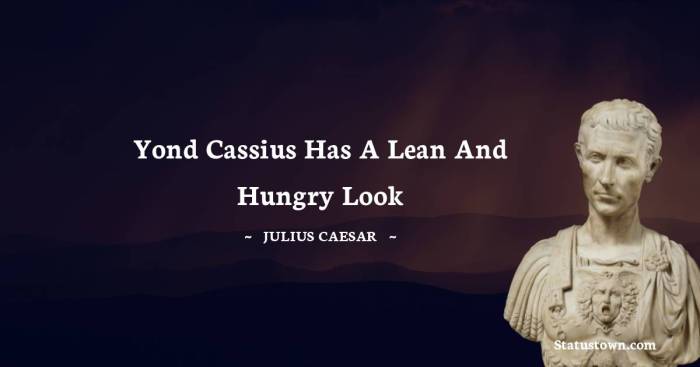
The phrase “yond Cassius has a lean” is a reference to the character Cassius in William Shakespeare’s play Julius Caesar. In the play, Cassius is a lean and ambitious Roman senator who conspires to assassinate Caesar. The phrase “yond Cassius has a lean” is spoken by Brutus, another Roman senator who is also involved in the conspiracy.
The phrase has come to be used more generally to describe someone who is thin and has a suspicious or untrustworthy appearance. It is often used in a negative sense, to suggest that someone is not to be trusted. However, the phrase can also be used in a more neutral sense, simply to describe someone’s physical appearance.
Usage in Literature and Popular Culture
The phrase “yond Cassius has a lean” has been used in a variety of works of literature and popular culture. Some examples include:
- In the novel “To Kill a Mockingbird” by Harper Lee, the character Atticus Finch uses the phrase to describe the defendant, Tom Robinson.
- In the film “The Godfather Part II,” the character Michael Corleone uses the phrase to describe his brother, Fredo.
- In the television series “The Sopranos,” the character Tony Soprano uses the phrase to describe his consigliere, Silvio Dante.
The phrase “yond Cassius has a lean” is a versatile and evocative phrase that has been used to describe a variety of characters in literature and popular culture. It is a phrase that is likely to continue to be used for many years to come.
Literary Significance: Yond Cassius Has A Lean
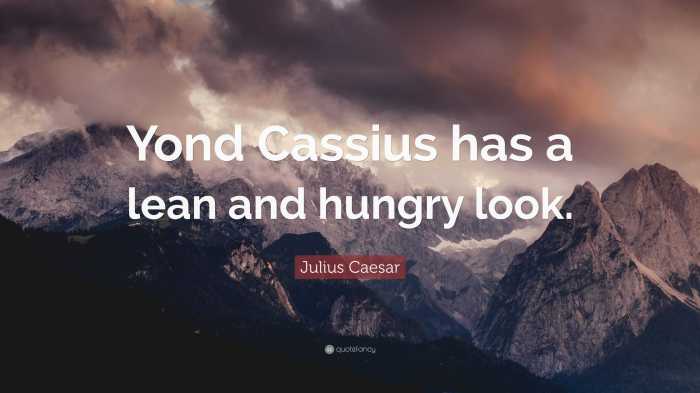
The phrase “Yond Cassius has a lean and hungry look” in Shakespeare’s “Julius Caesar” holds immense literary significance. It encapsulates the character of Cassius and his role in the play’s tragic events.
Character of Cassius
Cassius is a complex and ambitious character. His lean and hungry appearance reflects his shrewdness, cunning, and relentless pursuit of power. He is a master manipulator, able to sway Brutus to his side and sow discord within the Roman Republic.
Relationship to Brutus
Cassius’s relationship with Brutus is central to the play’s conflict. He exploits Brutus’s idealism and naivety to manipulate him into joining the conspiracy against Caesar. However, Cassius’s own ambition and self-serving nature ultimately lead to Brutus’s downfall.
Themes of Ambition, Betrayal, and Fate
The phrase “Yond Cassius has a lean and hungry look” also highlights the play’s themes of ambition, betrayal, and fate. Cassius’s ambition drives him to conspire against Caesar, but his own cunning and treachery lead to his own destruction. The play suggests that fate plays a role in human events, as Cassius’s actions ultimately contribute to the tragic downfall of the Roman Republic.
Cultural Impact
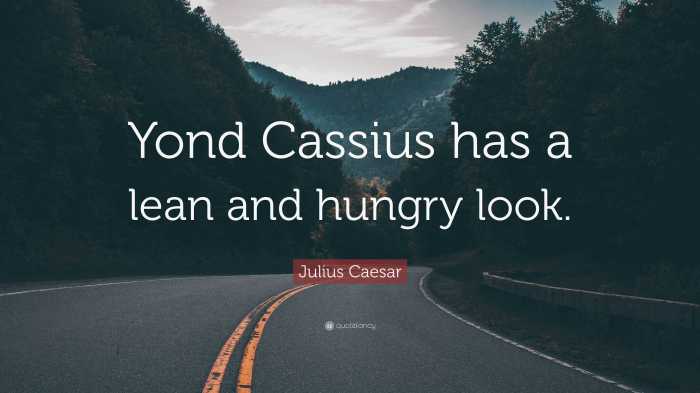
The phrase “Yond Cassius has a lean and hungry look” has had a profound cultural impact on Western literature and thought. Its evocative imagery and insightful observation of human nature have resonated with readers and audiences for centuries, inspiring countless works of art, literature, and popular culture.
In literature, the phrase has been used to describe characters who are ambitious, ruthless, and driven by a thirst for power. Shakespeare himself used it to foreshadow the character of Cassius in Julius Caesar, who ultimately betrays and murders Caesar in his quest for power.
The phrase has since been referenced and reinterpreted in countless other works of literature, including novels, plays, and poems.
Film, Television, and Music
The phrase “Yond Cassius has a lean and hungry look” has also been used extensively in film, television, and music. In film, it has been used to create memorable and iconic characters, such as the titular character in the 1957 film The Lean and Hungry Look. In television, it has been used in a variety of shows, including The Simpsonsand The Wire.
In music, the phrase has been referenced in songs by artists such as Bob Dylan, Bruce Springsteen, and U2. Its use in popular culture underscores its enduring relevance and cultural significance.
Contemporary Issues and Debates, Yond cassius has a lean
The phrase “Yond Cassius has a lean and hungry look” continues to be relevant to contemporary issues and debates. It is often used to describe politicians and other public figures who are perceived to be ambitious and ruthless. The phrase can also be used to describe individuals who are driven by a desire for success, regardless of the cost.
In the current political climate, the phrase has been used to describe both candidates in the 2016 presidential election. Some commentators have argued that Donald Trump’s “lean and hungry look” reflects his ambition and determination to win at all costs.
Others have argued that Hillary Clinton’s “lean and hungry look” reflects her experience and determination to make a difference in the world.
The phrase “Yond Cassius has a lean and hungry look” is a powerful and evocative reminder of the human capacity for ambition, ruthlessness, and determination. It is a phrase that continues to resonate with readers and audiences today, providing insight into the complexities of human nature.
Yond Cassius has a lean and hungry look. He’s always on the lookout for an edge, which is why he’s been researching taser 7 cartridge bay 1 . With its increased accuracy and range, it could give him the advantage he needs to take down his enemies.
But even with the best weapons, Cassius knows that it’s his own cunning and determination that will ultimately determine his success.
Artistic Representations
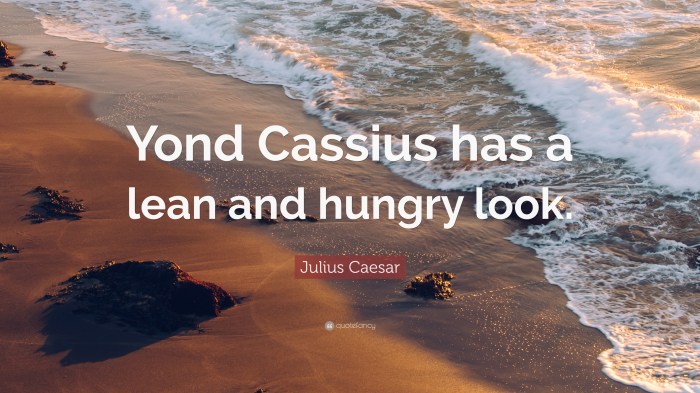
The phrase “Yond Cassius has a lean and hungry look” has been a source of inspiration for artists throughout history. Artists have used a variety of techniques and styles to convey the meaning of the phrase, capturing the character of Cassius and his dangerous intentions.
Here are some examples of artistic representations of the phrase:
Paintings
- Yond Cassius Has a Lean and Hungry Lookby John Everett Millais (1849): This painting depicts Cassius as a young man with a thin, gaunt face and piercing eyes. The painting captures the sense of Cassius’s ambition and his determination to achieve his goals, even if it means resorting to violence.
- Cassiusby William Blake (1805): This painting shows Cassius as an older man, with a long, white beard and a furrowed brow. The painting captures the sense of Cassius’s wisdom and experience, as well as his weariness with the world.
Sculptures
- Cassiusby Auguste Rodin (1884): This sculpture depicts Cassius as a muscular man with a determined expression. The sculpture captures the sense of Cassius’s strength and power, as well as his ruthlessness.
- Yond Cassius Has a Lean and Hungry Lookby Henry Moore (1958): This sculpture depicts Cassius as a hollow, skeletal figure. The sculpture captures the sense of Cassius’s emptiness and his lack of humanity.
Photographs
- Cassiusby Dorothea Lange (1936): This photograph depicts Cassius as a young man with a gaunt face and a piercing gaze. The photograph captures the sense of Cassius’s determination and his ambition.
- Yond Cassius Has a Lean and Hungry Lookby Diane Arbus (1964): This photograph depicts Cassius as an older man, with a long, white beard and a weary expression. The photograph captures the sense of Cassius’s wisdom and experience, as well as his weariness with the world.
The phrase “Yond Cassius has a lean and hungry look” has inspired artists to create a variety of powerful and evocative works of art. These works of art capture the essence of Cassius’s character and his dangerous intentions, and they continue to resonate with audiences today.
Modern Interpretations
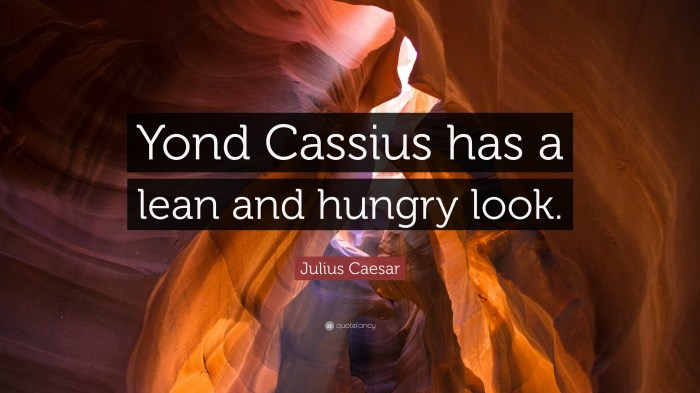
In the modern era, the phrase “Yond Cassius has a lean and hungry look” continues to resonate with audiences, inspiring contemporary interpretations that reflect evolving values and perspectives.
These interpretations often explore the themes of ambition, determination, and the consequences of unchecked ambition. In literature, art, and popular culture, the phrase has been adapted to convey a wide range of messages, from cautionary tales about the dangers of power to celebrations of resilience and self-determination.
Literary Adaptations
- In contemporary literature, the phrase has been used to explore the psychological complexities of ambitious characters. For example, in the novel “The Hunger Games” by Suzanne Collins, the character of Katniss Everdeen is described as having “a lean and hungry look,” reflecting her determination to survive and fight for her freedom.
- Another literary adaptation of the phrase can be found in the play “Julius Caesar” by William Shakespeare. In this play, the character of Cassius is depicted as a lean and hungry man who is driven by ambition to overthrow Caesar.
Helpful Answers
What is the meaning of “yond Cassius has a lean”?
The phrase refers to Cassius’s physical appearance in Shakespeare’s Julius Caesar, but it also symbolizes his ambition and his leanings towards conspiracy.
How has “yond Cassius has a lean” influenced Western literature?
The phrase has been referenced and adapted by countless writers, from Emily Dickinson to Toni Morrison, reflecting its enduring impact on our understanding of human nature and the complexities of power.
What are some examples of artistic representations of “yond Cassius has a lean”?
Paintings, sculptures, and photographs have captured the essence of the phrase, offering visual interpretations of its themes and characters.